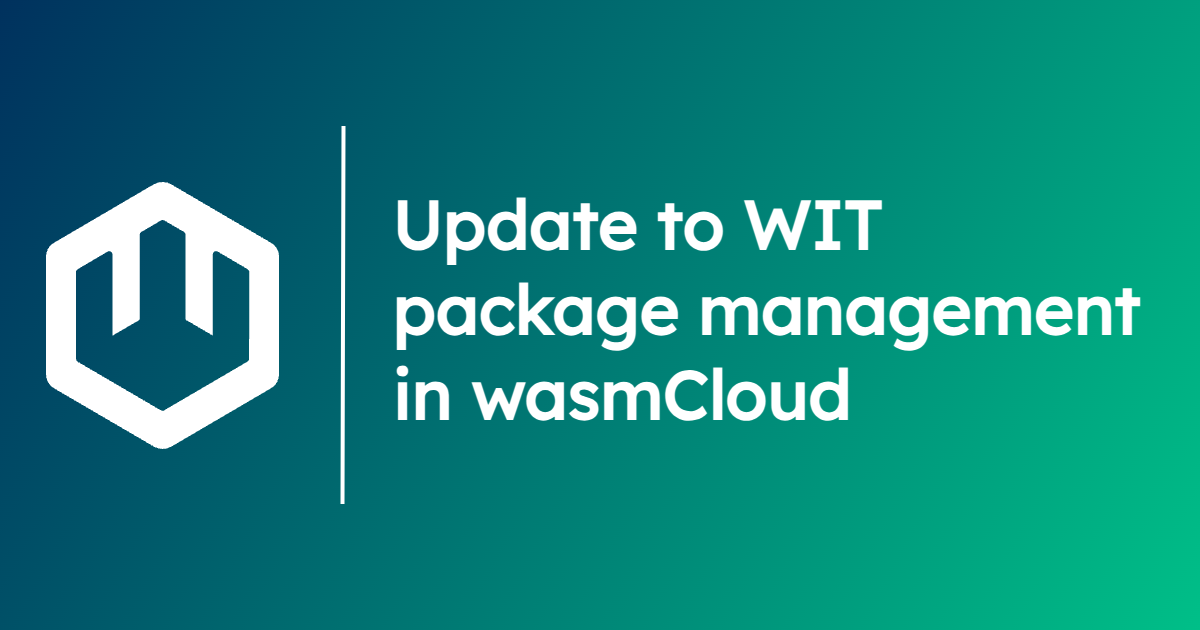Update to WIT package management in wasmCloud

wasmCloud's language-agnostic interfaces are defined using WebAssembly Interface Type (WIT) packages, which can be stored as OCI artifacts in your registry of choice.
As of wash v0.36, we're taking a big step forward in WIT package management, deprecating our usage of the wit-deps utility in favor of the OCI-compatible wkg. In this post, we'll take a look at the changes, break down exactly what's happening under the hood, and explain what it means for users.
What is changing?
For some time now, wash didn’t have any knowledge of dependencies and instead expected the user to use a separate wit-deps utility to fetch and update WIT dependencies as raw .wit files in the /wit/deps directory of a wasmCloud project.
That was originally intended as a brief, stop-gap solution, but wit-deps ended up serving as the stop-gap that just kept giving. As standards and approaches across the wider Wasm ecosystem were finalized, wit-deps fulfilled a critical role for a good deal longer than expected, and maintainer Roman Volosatovs in particular deserves a shout-out for the utility's above-and-beyond service.
Now as of wash v0.36, wit-deps usage is being deprecated in favor of a new set of ecosystem tooling called Wasm Package Tools and particularly the wkg (pronounced "wackage") command line tool.
wash integrates wkg as part of the wasm-pkg-tools library, so there's no need to download a new tool. Whether standalone or as part of wash, wkg handles the following jobs:
- Checking for WIT package dependencies
- Fetching WIT packages from known registries
- Pushing packages to your own registry
How wkg works
So how does wkg work with wash?
If you set one of our well-known interfaces as an import or export in your specified world file (usually world.wit), wash will make sure you have the proper packages when you build.
The tooling simply reads the world and downloads the appropriate dependencies automatically into the wit/deps directory (as well as generating a wasmcloud.lock file that captures the dependencies that were downloaded). With no further configuration, wash can download dependencies from the following well-known namespaces:
wasiwasmcloudwrpcba
Easy! When it comes to interfaces outside of those well-known namespaces (such as your own custom interfaces), you can configure wash and its integrated wkg to fetch those interfaces from a given registry. See our docs for more information.
We need to give a shout-out for wkg, too—it wouldn't have reached this point without a ton of amazing work from Taylor Thomas, Calvin Prewitt, Yoshua Wuyts, Lann Martin, and more contributors.
What it means for you
Our templates have been updated to use wkg for WIT package management, so if you start building a new component, you shouldn't have to think about WIT package management too much—the process will go just as described in the section above.
In this period of transition from wit-deps to wkg, wash is attentive to the system you're using—if you have a deps.toml file used by wit-deps in your wasmCloud project directory, wash will skip using wkg during a build, deferring to your wit-deps-based approach.
At the moment, capability providers still use deps.toml files and wit-deps—this will change in the near future, and we'll keep you updated when it does.
It's also worth noting that we're still finalizing our approach to configuring wkg usage in a wasmCloud project directory. Right now, we have folded in the wkg.toml file per the Wasm Package Tools docs into our wasmcloud.toml file—at the moment, this is how you would go about adding a custom interface to your project, for example. We also have heard the feedback from plenty of people that the current config format in wkg (that maps WIT packages to registries) is overly complex. Soon we would like to consolidate this configuration into something more simple that can live in the .wash directory for global config and the wasmcloud.toml file for local config. These changes will the be propagated up to the main wkg toolchain!
Any of these changes should be backwards compatible, but we want people to know it will be changing for the better so you aren’t surprised!
Get involved
wasmCloud is built on the contributions of the WebAssembly and wasmCloud communities. To chat about Bytecode Alliance projects like Wasm Package Tools and learn how to pitch in, check out the Bytecode Alliance Zulip chat.
To get involved with wasmCloud, join us on the wasmCloud Slack or at the next wasmCloud weekly community meeting. And stay tuned here to learn the latest developments with wkg!
